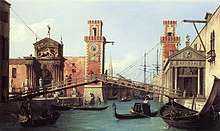Arming (ships)

In the age of sail, arming or victualling a war ship, or war vessel had the meaning of equipping the ships with all the materials to navigate and the "victuals" necessary for the crew to subsist. So, in addition to the rigging (masts, sails and ropes), the victualler (or sutler) should supply water and provisions and, eventually, cannons, offensive weapons and defensive weapons.
Victualling small boats without haste could be done without large facilities. On the contrary, the preparation of an army of war or military flocks, was usually carried out in arsenals and shipyards.
Arsenals and shipyards
[edit]In the Mediterranean there are many important and famous places where ships were built, armed and victualled, especially those intended to support military flocks. One only has to remember the Piraeus arsenal, the Carthage arsenal, the Tortosa shipyards, the Venice arsenal, the Barcelona shipyards, the Valencia shipyards, the Mallorca shipyards... and many others.
In all cases there were buildings, closed with a lock and key and with an armed guard, to store the necessary material: guns, pulleys, anchors, trees (sticks), antennas, sails, auxiliary boats, rudders, oars, bombards, armor, paveses, crossbows, pins, . . . In the case of the Barcelona shipyards, there are many documents (inventories in particular) that list the variety of items needed to arm a ship.[1]
Documents
[edit]- 1283. Ramon Muntaner often talks about arming galleys and other ships.[2]
E com vench l'endemà, lo senyor rey se feu venir l'almirall, e dix-li: Almirall, tantost armats XXV galees e armats-les axí que cascuna haja un còmit cathalà e altre llatí,...
— Crònica de Ramon Muntaner. Capítol LXXVI.
- 1378. Privilege of Peter the Ceremonious in the city of Barcelona to arm a galley (“la galea de l'almoina”) with voluntary donations to defend the waters of Barcelona against pirates and corsairs.[3]
- 1406. Galley armed by Mateu Cardona.[4]
- 1462. Roger, Count of Pallars, asks for a galley to arm it.[5]
References
[edit]- ^ Les dreçanes barcelonines: sos inventaris y restauració. Francesc Carreras i Candi
- ^ Ramon MUNTANER; Antonio de BOFARULL Y BROCÁ (1860). Crónica Catalana ... Texto original y traduccion castellana, acompañada de numerosas notas, por Antonio de Bofarull. Cat.&Span. p. 137–.
- ^ Antonio de Capmany Surís y de Montpalau (1792). Memorias historicas sobre la marina comercio y artes de la antigua ciudad de Barcelona publicadas... Y dispuesta por D. Antonio de Capmany y de Montpalau... En la imprenta de D. Antonio de Sancha. p. 152–.
- ^ Maria Teresa Ferrer i Mallol; Josefa Mutgé Vives (2005). La corona catalanoaragonesa i el seu entorn mediterrani a la baixa edat mitjana: actes del seminari celebrat a Barcelona, els dies 27 i 28 de novembre de 2003. Editorial CSIC - CSIC Press. p. 109–. ISBN 978-84-00-08330-4.
- ^ Próspero de Bofarull y Mascaró; Manuel de Bofarull y de Sartorio; Francisco de Asís de Bofarull y Sans (1862). Colección de documentos inéditos del Archivo General de la Corona de Aragón. J.E. Montfort. p. 234–.


 French
French Deutsch
Deutsch